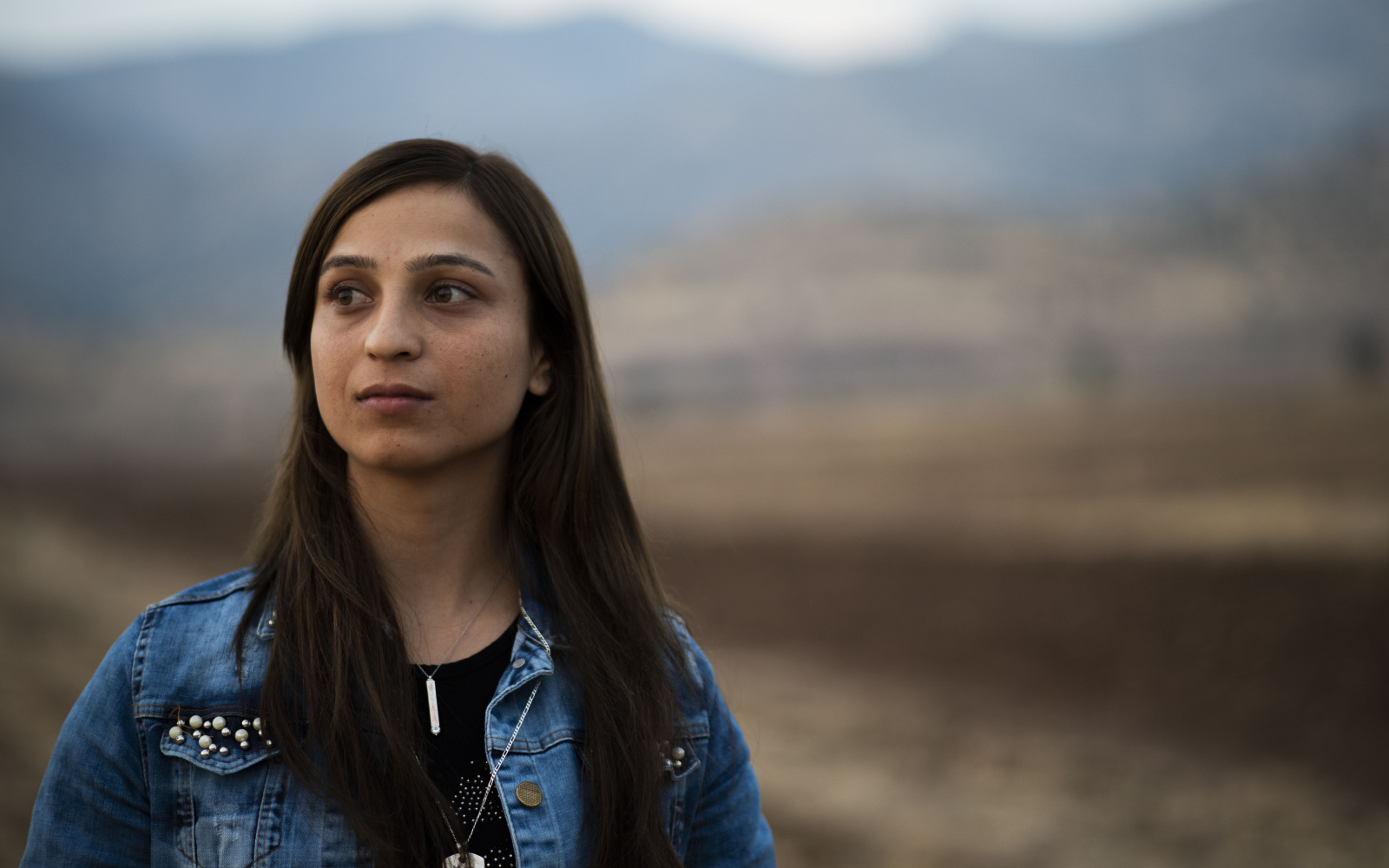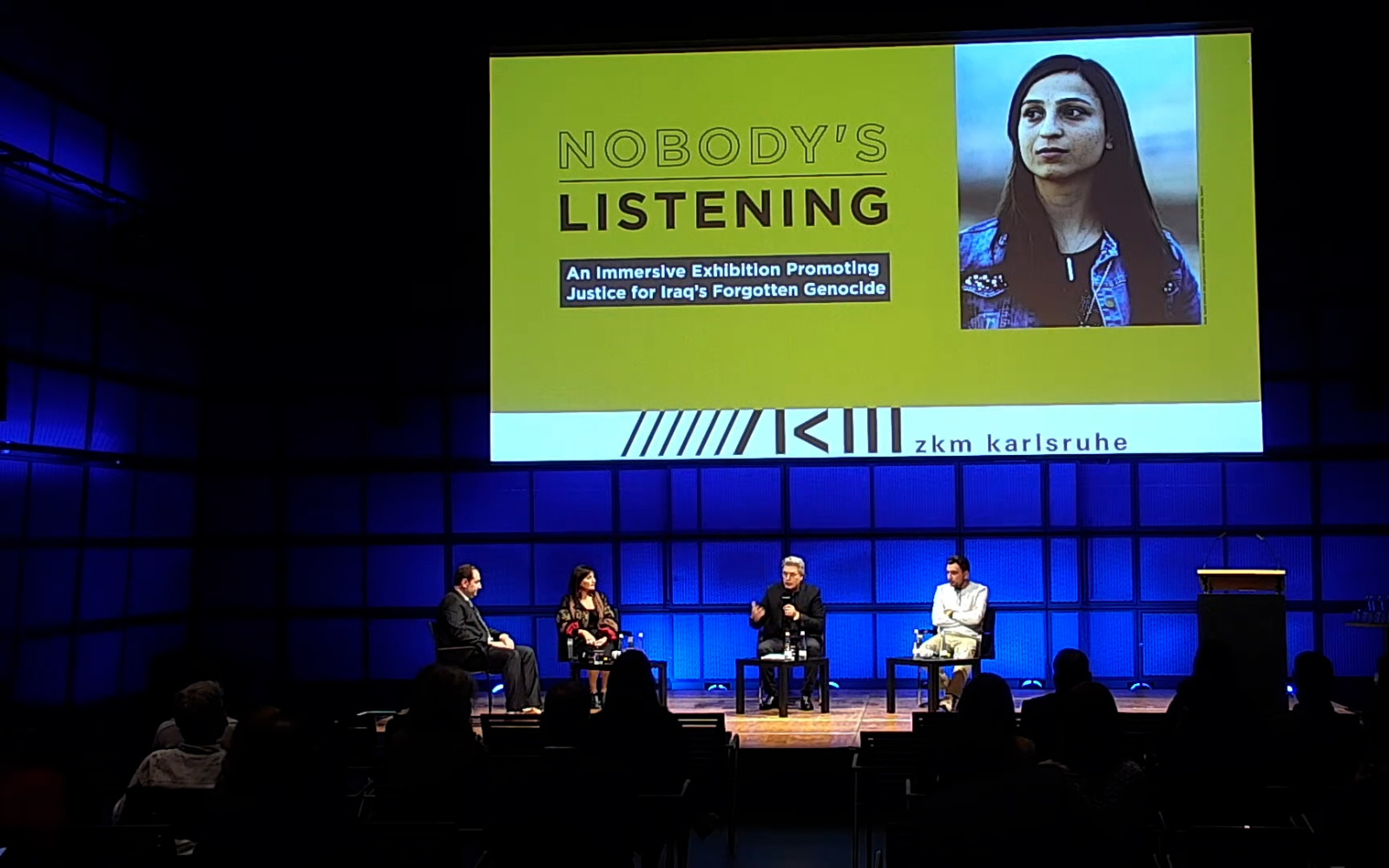Surviving Genocide: The Power of Art for Healing
Panel discussion with Nahrin Malki, Falah al Rasam and Ivana Waleed moderated by Jan Ilhan Kizilhan
Fri, October 01, 2021 4:00 pm CEST
- Location
- Media Theater
- Online
- Language
- English
The exhibition opening »Nobody's Listening« will be accompanied by a panel discussion on »Surviving Genocide: The Power of Art for Healing«.
On October 1, 2021, the immersive art and virtual reality exhibition »Nobody's Listening« will open on the ZKM Museum Balcony. The first presentation of works by Yazidi, Christian and Muslim artists in this exhibition uses virtual reality technology to take museum visitors through the destroyed houses in the Iraq town of Sinjar and confronts them with the devastating consequences of the genocide against the Yazidis which was perpetrated by the so-called Islamic State (IS) on August 3rd, 2014 in northern Iraq.
The conversation will feature Ivana Waleed, a Yazidi activist and survivor, Nahrin Malki, an Assyrian artist based in Sweden, and Falah al-Rasam, a Yazidi painter based in Iraqi Kurdistan. The conversation will be facilitated by Dr. Jan Kizilhan, the renowned chief psychologist of the Special Quota Project, who will guide the discussion around the themes of persecution, identity and the artists’ work featured in the exhibition.
The event is part of the exhibition opening »Nobody's Listening« and will be held in English.
Surviving Genocide: The Power of Art for Healing [EN]
Surviving Genocide: The Power of Art for Healing [EN]
Surviving Genocide: The Power of Art for Healing [KMR]
Surviving Genocide: The Power of Art for Healing [KMR]
Surviving Genocide: The Power of Art for Healing [AR]
Surviving Genocide: The Power of Art for Healing [AR]
Nahrin Malki is an Assyrian professional artist and painter currently living in Sweden. Born in Syria, she fled to the Netherlands almost two decades ago, when the Assad regime began to attack the Assyrian community, which has some of the most ancient cultural roots in the region. Nahrin grew up in a secure and liberal family environment where art and learning were encouraged. She was always drawing as a child, even copying stickers for friends who could not afford them, yet she felt trapped and unable to express herself under a regime which suppressed artistic freedoms and creativity. It was in the Netherlands that she was finally able to realize her artistic potential, studying at the AKI Kunstacademie in Enschede. Her main objective now is to connect the Assyrian people with their heritage and collective experience, through the central theme of suffering in her artwork. Her painting »Nineveh« is based on a real-life image, depicting a woman carrying a cross, as when the Assyrians were driven from their villages. For Nahrin, the restitution of Assyrian culture is a priority: “We have been forgotten about. We want to rebuild our schools that can teach our language and culture, and we want our books and historical artefacts returned to us. Churches in particular are cultural centres of our history since we do not have a country.”
Ivana Waleed is a young Yazidi artist from the village of Tel Qasab, near Sinjar in northern Iraq. She endured many months of brutality and suffering in ISIS captivity, but she does not refer to herself as a »survivor« because she does not consider herself a victim. By escaping her captors, she says she has beaten ISIS, and she now works tirelessly to bring perpetrators to justice. The Special-Quota Project of the German federal state of Baden-Württemberg, which settled 1,100 Yazidi women and children, gave Ivana what she calls a »golden chance« to start a new life. One of the support initiatives of the Baden-Württemberg project is art therapy, where participants draw and then discuss their art works and related emotions. Ivana’s untitled painting of a faceless woman was the product of just two such meetings in 2019. She reveals that she had wanted to draw a face for this woman, but ultimately felt unable: “When I stand in front of this picture, I think it is me, and when other women stand in front of it they should think the same, because this woman represents every one of us. If she had a face it would determine whether she is sad or happy, but nobody could be sure; each woman who looks at the painting should make her own decision as to what she sees and what name the painting should have.”
Falah al-Rasam is a Yazidi artist currently living in an IDP camp in Iraqi Kurdistan. He has lived in the camp by ISIS in the summer of 2014, a moment which marked the beginning of the latest genocide in his community’s long history of persecution and suffering. In the difficult conditions of the camp he has fashioned a new career for himself as an artist, adopting the pseudonym Falah Al-Rasam (the Painter). He has now sold several paintings and grown an online following for his artwork, even though he produced primarily written works before the terrible upheavals of 2014. Falah’s literary background and experience in writing poetry and short stories inspires his art. His own favourite painting depicts a famous photo of Yazidi female fighter carrying a weapon, in Sinjar in 2014. The woman is shown on a road leading to Yazidi villages, standing ready to defend her community. Falah painted this subject from a photograph and comments that the picture as a whole reflects those dark times.
Prof. Dr. Dr. Jan Ilhan Kizilhan is a psychologist, author and publisher, with research interests in psychotraumatology, sexual violation, trauma, terror and war, transcultural psychiatry, psychotherapy, clinical psychology and psychotherapy, migration research and socialization-war research. Kizilhan studied psychology and sociology at the University of Bochum (Germany). He holds a Doctorate in psychology from the University of Konstanz (Germany). In 2014, he joined the New Iran and Islamic Studies department at the University of Göttingen and became the founding Dean of the Institute for Psychotherapy and Psychotraumatology at Dohuk University in Northern Iraq. Kizilhan is the chief psychologist of the Special Quota Project for Vulnerable Women and Children in Northern Iraq, funded by the State Government of Baden- Württemberg. Since 2016 he founding Dean of the Institute of Psychotherapy and Psychotraumatology at the University of Duhok in Northern Iraq. Since March 2018 he is the director of the new Institute for transcultural Health Science at the State University Baden-Württemberg in Germany.

